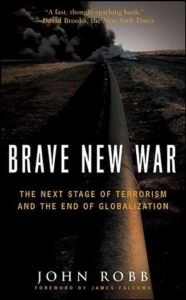Strategy Review: Brave New War
 In my most recent posts I looked at the strategic theories of two different authors. The first was Thomas P. M. Barnett, who divided the world into functioning, integrated Core states, and their danger-producing opposites, the Gap states. His mantra was “disconnectedness defines danger.” The second was Philip Bobbitt, who divided history into epochs in which different forms of the state ruled. He taught us that the nation state is on its way out, and the new market state is taking its place.
In my most recent posts I looked at the strategic theories of two different authors. The first was Thomas P. M. Barnett, who divided the world into functioning, integrated Core states, and their danger-producing opposites, the Gap states. His mantra was “disconnectedness defines danger.” The second was Philip Bobbitt, who divided history into epochs in which different forms of the state ruled. He taught us that the nation state is on its way out, and the new market state is taking its place.
John Robb is an author who actually references both of the previous authors, in his book Brave New War. He springboards off of Bobbitt’s concept of the market state to argue that the nature of warfare has changed, becoming network-focused, and refutes Barnett’s mantra. Basically, in the globally networked world, connectedness defines danger, so good luck finding peace through integration. Better to develop doctrines of fighting networked war.
A war fought between social networks is exactly how Robb portrays the current Crisis Era in American politics. He calls this “open source warfare” in that anyone can participate in an era when the Internet gives individuals powers of surveillance and intelligence gathering that were once reserved for governments. You can follow more of John Robb’s analysis of current events here at his blog.
2 thoughts on “Strategy Review: Brave New War”
In a recent post, Robb wrote:
“This moral network recently expanded with the addition of the #neveragain movement, after the Parkland shootings. In the past, a movement like #neveragain would be focused on gun control through changes in government legislation. Now that it’s part of this weaponized moral network, that focus is going to change.
Why? This weaponized network isn’t interested in just changing legislation. It’s far more ambitious than that. It wants to change everyone’s behavior and it is building the means to do it.”
I think he has it backwards. The Parkland students are using the tools of public mobilization, freely available to them, because the legislative process has failed to entertain even the least controversial firearms reforms. That isn’t a sign of the irrelevance of traditional parties and lobbying movements. It is, rather, an obvious demonstration of the power of the traditional organs of the Conservative movement, particularly as expressed through their absolute control of the Republican Party. FOX News and the NRA, two traditional institutions, have held the line against gun reform for more than forty years even though nearly eighty percent of Americans do not own a firearm. Even now, there will no meaningful federal reform until 2021 at the earliest, a full three years after the Parkland shooting.
John Robb has a unique and over the top perspective. These days he is really hyped up about social media, calling it a game-changer, but I agree with your point. It is just the current form of popular mobilization. And when the people don’t get what they want from their representative government, they take to the streets (or Twitter). I was actually going to use Robb’s “weaponized social media” idea as a foil in a blog post on how Millennials use social media to build consensus.